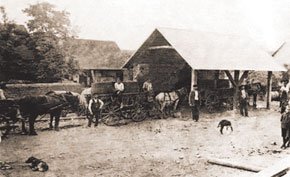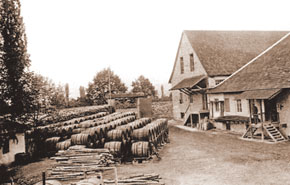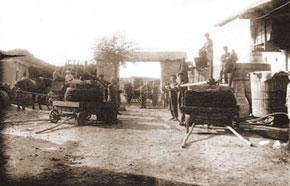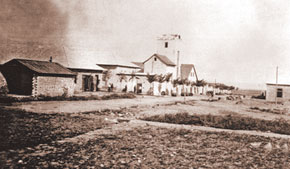
Throughout the entire history of international relations between Germany and Azerbaijan, interesting and unique connections have been observed
Throughout the history of international relations between Germany and Azerbaijan, there have been unique and fascinating connections. As a result, German cultural heritage holds an important place in Azerbaijan, not only due to its historical value but also because it plays an active role in shaping modern bilateral relations between the two countries, CE Report quotes Trend.
A key element of these relations is the German cultural heritage in Azerbaijan, which reflects the historical presence of the German community as well as its influence on current diplomatic and cultural cooperation.
A Brief History
The history of Germans in Azerbaijan dates back to the 19th century. During the expansion of the Russian Empire, German settlers were invited to the Caucasus to help develop the land and boost economic growth.
The settlement of Germans, mostly from Swabia, began in the spring of 1819 when they founded two colonies: Yelenendorf and Annenfeld (now the cities of Goygol and Shamkir). Over time, several other colonies were established, including Greenfeld, Traubenfeld, Elisavetinka, Eigenfeld, and Georgsfeld. These colonies were economically and culturally interconnected, with Yelenendorf serving as the unofficial center, being the largest German colony in the Caucasus. Despite cultural and linguistic differences, the Germans and the local population maintained close relations in both cultural and economic spheres. Azerbaijanis welcomed the settlers with hospitality, helping them adapt to their new surroundings by sharing food.

Wine maturing under the sun, registration department, Yelenendorf.
Most of the German settlers were farmers who continued traditional agriculture in their new homes. They introduced a multi-sector agricultural economy, brought agronomic knowledge, technical innovations, and cultural traditions. The booming oil industry in Baku benefited greatly from the expertise of German engineers, technicians, and specialists. Notably, the Siemens brothers played a key role in building a copper smelting plant in the Gedabek region in the mid-19th to early 20th century (extracting copper and gold), assisting with the construction of the Kalakend hydroelectric station (the first in Transcaucasia), building oil pipelines and telegraph lines, and discovering the Dashkesan cobalt deposit. These contributions left a lasting economic and cultural legacy, which included the creation of schools, churches, and other institutions.
A notable film, The Scholler Archive by Jalaladdin Gassimov, dedicated to the 200th anniversary of the settlement of German colonists in Azerbaijan, has won numerous international awards. Based on real events, the film tells the story of the German colonist Scholler and his family, who moved to Azerbaijan in the 1840s due to difficult socio-economic conditions in Germany after the Napoleonic Wars. The theme of true friendship between the settlers and the local population runs throughout the film. The Schollers applied their organizational and business skills in the Tovuz region of Azerbaijan.
German Cultural Heritage in Azerbaijan
German cultural heritage is still very much present in Azerbaijan today and continues to shape the country’s cultural identity. One of the most striking examples is the architecture left behind by German settlers. In Baku and other cities, there are several buildings in the German architectural style, including churches, schools, and public buildings, that emphasize the cultural ties between Germany and Azerbaijan. This architecture not only contributed to the urban landscape but also helped preserve a unique German cultural legacy.

Preparing for grape-crushing, Aigenfeld
The first Lutheran church in Azerbaijan, St. John’s Church, was built in Goygol from 1854 to 1857. The church, constructed in the neo-Gothic style, featured an organ made by the company "E.F. Walcker & Cie." based in Ludwigsburg. Built of red stone, the church has a clock tower, 16 large and 2 small windows, and two entrance doors. During Soviet times, the bells were removed, the altar destroyed, and the organ taken away. Later, the building was repurposed as a military hospital and sports hall. After Azerbaijan regained independence in 2001, the church was added to the list of immovable historical and cultural monuments. Since 2005, it has housed a local history museum. The building was thoroughly renovated in 2008.
The "Church of the Savior" in Baku, also known as the Lutheran Church, was designed by architect Adolf Eichler in the neo-Gothic style. The foundation ceremony took place on March 21, 1896. In the following years, a 200 kg gilded cross was placed on the spire, church bells and an organ were installed. The consecration ceremony, held on March 14, 1899, attracted over a thousand people. On April 23, 1900, the first organ concert took place, featuring works by Johann Bach. Today, the church hosts cultural events and classical music evenings.
The Lutheran church in Shamkir was built in 1909, also in the neo-Gothic style, thanks to donations from Johann Bepply and Johann Beck. The architect was Ferdinand Lemkul. The consecration ceremony took place in 1911, led by the bishop of the Transcaucasian Evangelical Lutheran communities, Baron von Engelhardt. During the Soviet era, the building served as a cultural center, a teachers’ house, and a historical-ethnographic museum. After Azerbaijan regained independence, the church was included in the list of historical and cultural monuments. Restoration work was carried out in 2011-2012, and an organ was installed, reconstructed according to the original plans.

Cellars and refinery, Annenfeld
The Lutheran church in Ganja was built in 1885 with donations from the community. The building, designed in an eclectic style, was made of tuff stone and covers an area of about 650 square meters. The building is divided into a central hall and a foyer. Today, the building is used for puppet theater performances. The Lutheran church in Shamakha was built in 1868-69 according to the design of Otto Hippiuss, and the church in Gedabek was constructed by the "Siemens & Co." company in 1868.
In addition to their architectural contributions, German settlers also helped develop education in Azerbaijan by establishing schools. This became a bridge between Western and local cultures, fostering intercultural exchange that still resonates today. The influence of German settlers is also evident in music, literature, and the arts.
Significance of German Cultural Heritage for Modern Relations
German cultural heritage continues to play a crucial role in contemporary Azerbaijani-German relations. These cultural and historical ties provide a strong foundation for bilateral cooperation today. They symbolize a shared history while also serving as a practical base for collaboration in various fields.
Today, German cultural heritage is actively preserved through numerous initiatives and institutions. For example, the Goethe Institute in Baku organizes events such as exhibitions, concerts, and literary evenings, which promote mutual understanding and strengthen cooperation between the two countries. Education is another important area of collaboration. Many Azerbaijani students participate in exchange programs in Germany, study at German universities, or receive professional training there.
There are numerous opportunities to revive cultural heritage and deepen Azerbaijani-German cooperation. These include joint research projects, cultural exchange programs, and partnerships in education and culture.
German cultural heritage in Azerbaijan plays a vital role in Azerbaijani-German relations. The historical ties established by the German presence in the 19th and 20th centuries serve as the foundation for dynamic and enduring cooperation between the two countries. Recognizing and utilizing this heritage is key to taking Azerbaijani-German relations to the next level.























